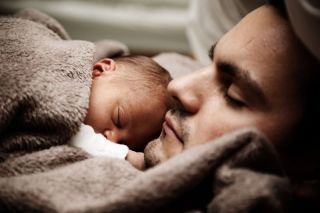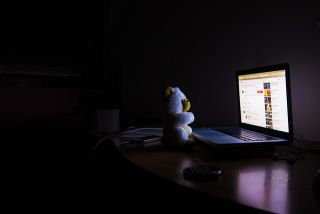Sleep
Caffeine and the Fear of Death
Let’s dive into the neuroscience and existential meaning of caffeine use.
Updated February 4, 2024 Reviewed by Ray Parker
Key points
- Our culture values work over rest, which has adverse physical and psychological effects.
- Caffeine decreases our awareness of sleepiness and unlocks vigilance, curiosity, and euphoria.
- Existentially, caffeine represents our desire to transcend death and the awareness of being limited.
- A healthy confrontation with our death and limits helps us to live a more authentic, meaningful, present life.
This is Part 1 of a series. To read part 2, click here.
“To die, to sleep—to sleep, perchance to dream—ay, there’s the rub, for in this sleep of death what dreams may come....” —Shakespeare’s Hamlet
“The idea of death, the fear of it, haunts the human animal like nothing else; it is a mainspring of human activity—designed largely to deny the fatality of death, to overcome it by denying in some way that it is the final destiny of humanity.” —Ernest Becker, Ph.D., The Denial of Death
“Although the physicality of death destroys humans, the idea of death saves us. . .death is the condition that makes it possible for us to live life in an authentic fashion.” – Irwin Yalom, M.D., Existential Psychotherapy
“For most of us, to be caffeinated to one degree or another has simply become baseline human consciousness. . . it’s easy to overlook the fact that to be caffeinated is not baseline consciousness, but an altered state....”—Michael Pollan, Caffeine: How Coffee and Tea Created the Modern World
At the age of forty-four, I quit caffeine for a period of four months after a prolific thirty-year coffee and tea drinking career—my fear of death to "thank."
My process of giving up caffeine was due to heart issues and the existential battle that often waged within me. Part of me longed for the reassuring, immortality-mimicking, and limit-busting jolt of a hot cappuccino or a creamy matcha latte, while, at the same time, another part of me longed to slow down, dream, meditate, accept my limitations, and stay safe.
I have explored the neuroscience of caffeine use and presented an existential psychology interpretation of our relationship to caffeine.
Comforting caveat: This post does not promote quitting caffeine. I hope most of my readers enjoy your favorite hot or cold caffeine delivery system as you read, experiencing the decreased sleepiness and increased curiosity and vigilance afforded by this powerful drug. Since 90 percent of the planet consumes caffeine daily, it's a safe bet you are caffeinated right now.
Note: I have edited quotations from older works of literature for more gender inclusive language.
Sleep Science and Adenosine
Upon waking, sleepiness rebuilds in the brain. Neurochemically, the pressure to slow down toward sleep increases as we go about our day.
Neuroscientists identified what drives sleepiness: the neurotransmitter adenosine. Energy combusted in the central brain births adenosine. Levels mount as the day progresses.
The price of "having energy," of waking and living life, is "getting sleepy." The yin/yang, the push-pull. We are born every morning, and, in a sense, we die over the course of the day, culminating in our actual collapse into bed.

Caffeine Works by Decreasing Awareness of Sleepiness
Adenosine promotes the regulation of sleep by sparking the release of the neurotransmitter GABA, which holds back neurons implicated in arousal and wakefulness. When not blocked, adenosine receptors decrease neurotransmitters' activity, such as dopamine (motivation, curiosity, seeking reward) and norepinephrine (adrenaline, vigilance, euphoria, empowerment).
Caffeine disrupts adenosine's ability to communicate with the brain by aggressively blocking adenosine receptor sites. Sleepiness still circulates but cannot communicate with the brain.
Caffeine makes us less aware of our sleepiness, in the service of what, and at what cost, is perhaps what we should be asking more deeply.
When caffeine wears off, circulating adenosine lands on receptor sites, and we crash. Some report depressed feelings when withdrawing from caffeine.
An Existential Meaning of Caffeine

Our fear of "sleepiness" may be our human desire to transcend death itself, to shoot past any sense of being limited, vulnerable, or open to the paradoxical and painful sweetness of existence. With each cup of caffeine, we hope to achieve immortality.
The cultural anthropologist Ernest Becker, Ph.D., in his Pulitzer-prize-winning book The Denial of Death, writes that human beings have both a "creaturely" and a "symbolic" nature. "We are food for worms, and we are soaring angels" (Schneider and Krug, 2017).
Becker wrote: "Humanity's innate and all-encompassing fear of death drives us to attempt to transcend death through culturally standardized hero systems and symbols."
I argue that caffeinated consciousness and behavior have become our "culturally standardized hero system and symbol" for transcending death.
We Excessively Value Work and Alertness
Is it curious that our first thought upon waking up is how to wake up harder, faster, longer, and more completely with caffeine? Even the way we wake up is not productive enough for us, it seems. And yet, is it not touching and a little moving that we try so hard as humans?
There is an economic incentive and pressure: be more productive. Consume. And do it now and do it fast, please.
Other times, trauma robs us of the ability to withstand, let alone enjoy, a calm and safe present moment. In trauma, feeling safe is unsafe—we need to be on guard. With its unleashing of adrenaline, caffeine is a defense against trauma.
From an evolutionary perspective, being asleep is a survival liability versus being awake, vigilant, looking for food and mates, and avoiding saber-toothed tigers. And yet, being unnecessarily vigilant is an evolutionary liability in the longer run—wasting energy, harming the body, and putting us at risk of being crashed-out when the real threat arrives.
Something to Fear: Lack of Sleep

Being sleepy can be dangerous, and yet not sleeping, or not sleeping well enough or long enough, is definitely dangerous.
According to sleep scientist Matthew Walker, insufficient sleep or lower quality sleep puts us at increased risk for dementia, heart disease, cancers, and hormonal imbalances, such as low testosterone. Perhaps caffeine's biggest negative health impact is its deleterious impact on sleep.
The Centers for Disease Control (CDC) reports the top three leading causes of death in the United States in descending order: heart disease, cancer, and COVID-19.
According to Walker, one-quarter of our dose of caffeine still circulates in our system 12 hours after caffeine consumption, making it harder for us to drift into and stay in the deeper stages of restorative sleep.
In ancient times, tribe members decided who stayed up for protection (such as the younger folks). We can't typically pick a younger coworker to stay alert for us during the workday while we drift off into contemplative reverie, or be fiercely assertive and analytical for us in the next meeting while we remain calmly present.
In United States culture, and in many other modern cultures, sleepiness during the work or school day is a symbolic, if not literal, death. Sleepiness means we can't keep up with the image or exceed cultural expectations. We could lose face, lose our job, lose our self-respect, lose love.
Opening Up Big Psychological Questions
How do cultural ideals around productivity, concentration, confidence, assertiveness, and positive emotion, however beneficial, hold us back from a more complete and deeply human experience and cause us to feel like we don't perfectly measure up?
Does caffeine have a role in supercharging these cultural ideals, expectations, and pressures? Or has caffeine been coopted by these ideals?
References
Becker, Ernest (1973). The denial of death. Free Press.
Becker, Ernest (1975). The escape from evil. Free Press.
Evans J, Richards JR, Battisti AS. Caffeine. [Updated 2023 Jun 8]. In: StatPearls [Internet]. Treasure Island (FL): StatPearls Publishing; 2023 Jan-. Available from: https://www.ncbi.nlm.nih.gov/books/NBK519490/
Huberman, Andrew. (August 2, 2021). Dr. matthew walker: the science and practice of perfecting your sleep [Video]. Huberman lab podcast. https://www.youtube.com/watch?v=gbQFSMayJxk
Johns Hopkins Medicine Department. (Nd). Sleep-wake cycles. Hopkins medicine. https://www.hopkinsmedicine.org/health/conditions-and-diseases/sleepwake-cycles
Kaufman, Scott Barry. (2020). The nerdy dopamine pathway. Retrieved from: https://scottbarrykaufman.com/the-nerdy-dopamine-pathway/
Pollan, Michael (2019). Caffeine: how coffee and tea created the modern world [Audiobook). Audible Originals.
National Center for Health Statistics. (Nd). Leading causes of death. Retrieved from: https://www.cdc.gov/nchs/fastats/leading-causes-of-death.htm
Schneider, K.J., Krug, O. (2017). Existential-humanistic psychotherapy. American Psychological Association (APA).
Shakespeare, William (2001). Hamlet. Penguin Books.
Walker, M. P. (2006). Sleep to Remember: The brain needs sleep before and after learning new things, regardless of the type of memory. Naps can help, but caffeine isn’t an effective substitute. American Scientist, 94(4), 326–333. http://www.jstor.org/stable/27858801
For more work from Dr. Walker, see: https://www.humansleepscience.com/p-u-b-l-i-c-a-t-i-o-n-s
Yalom, Irwin (1980). Existential psychotherapy. Basic Books.




